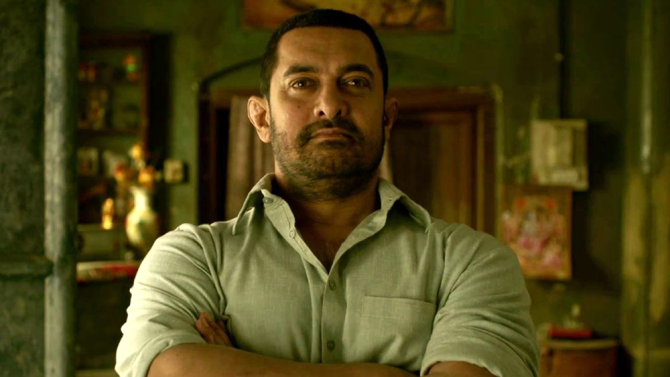

A Bollywood girl-power drama about a father-coach turning his daughters into star wrestlers is too much of a formula thing.
Aamir Khan, the star of “Dangal,” is as formidable and celebrated a movie star as India has going. Two years ago, he played the lead character in “PK,” a sci-fi comedy about an alien who visits earth and points out everything wrong with it; the film went on to become the top-grossing movie in Bollywood history. Fifteen years ago, Khan starred in “Lagaan,” the transporting colonial cricket-match musical that was the last Indian film to be nominated for an Academy Award. In “Dangal” (the title means “Wrestling”), Khan has aged nicely. He keeps his short muscular body poised, and his cropped hair sets off jutting ears, plunging eyebrows, and a serene scowl that almost never leaves his face; he looks like a jock version of Salman Rushdie. Yet within that tight-lipped mask, he finds a hundred ways to communicate emotion.
That’s more than you can say for “Dangal,” a one-trick domestic sports drama that drags on for two hours and 40 minutes. “Lagaan,” which was close to four hours, earned every minute of its running time, but “Dangal” is just a thin inspirational tale stretched out well past the point that U.S. audiences will have much patience for it.
It’s based on the true story of Mahavir Singh Phogat, an amateur wrestler who lived for the proud dream of seeing his country take home athletic “gold.” (It sounds like he’s talking about the Olympics, but he means any international competition.) Due to a lack of government sports funding, Mahavir wasn’t able to go for the gold himself (he became an office worker). So he took his two eldest daughters, Geeta and Babita, and turned them into competitive wrestlers, cutting against the grain of what Indian society wanted and expected girls to be.
In “Dangal,” is Mahavir a domineering stage father, using his kids to live out his failed dreams? No doubt. That’s why he prays to have sons. But when God blesses him with daughters, he transfers his obsession with molding a champion right onto them; as a coach, he’s both a domineering egotist and a de facto feminist. If the movie has a theme, it’s that Mahavir is a patriarchal thinker forced, by circumstance, to move into the 21st century. He’s a lot like India itself.
That means, among other things, that he’s going to treat his daughters with no mercy. When they’re teenagers, he subjects them to a grueling training regimen (worst restriction: no spicy food), and the defining moment comes when he cuts off their hair. It’s a lot like a Marine cut; as the two see it, they’ve been shorn (tearfully) of their identities, which their father will now rebuild from the ground up. There is — or could have been — a resonance to all of this. But Nitesh Tiwari, the director of “Dangal,” works strictly on the surface. The movie isn’t a musical, but it’s got a lot of those tabla-meets-EDM Bollywood dance tracks, and when one of them is laid over a training montage, the effect is less Bollywood than cookie-cutter Hollywood. It’s the equivalent of watching an American movie with the same story starring Greg Kinnear as the dad/coach and Dove Cameron and Lizzy Greene as the daughters, only with the cliché training sequence set to “Gonna Make You Sweat (Everybody Dance Now).” “Dangal” is that kind of movie.
When the girls get older, the film switches actresses (the two younger ones, Zaira Wasim and Suhani Bhatnagar, are big-eyed urchins who barely register), and Fatima Sana Shaikh, who takes over the role of Geeta, emerges as Khan’s co-star. She has a gentle, dimpled face, but with her hair cropped she resembles a competitively coiled Kate Winslet, and there’s something touching in her devotion. Geeta is so fierce, yet is so carrying out the will of her father (which becomes her will), that she’s a revolutionary and a bowing disciple at the same time. The movie is way too vague about the essential facts of female wrestling in India. In the first half, it implies that Geeta and her sister are breaking the mold — that they’re heading into boys’ terrain, to the point that they have no choice but to wrestle boys. By the time they land at the National Sports Academy, where the coach becomes a rival to Mahavir, they’re suddenly part of a whole team of young-women wrestlers. When did that happen? You think: Good for India, but it renders the film’s journey more conventional than it had implied.
“Dangal” culminates in a championship bout at the Commonwealth Games in New Delhi, and Tiwari stages it well. Geeta has to face down an Australian wrestler with a raw-boned look to kill, and as much as any boxing drama, the movie makes you feel the human ferocity in both of them. To raise the stakes, Mahavir isn’t even there; a foe has literally locked him in an office. Geeta, to be true to her father’s dream, must do it on her own. There’s hardly a moment in “Dangal” that doesn’t go according to the numbers, but after 160 minutes’ worth of formula, the movie certainly hits a note of touching tribute to the way girl power is sweeping the world.
-Variety
